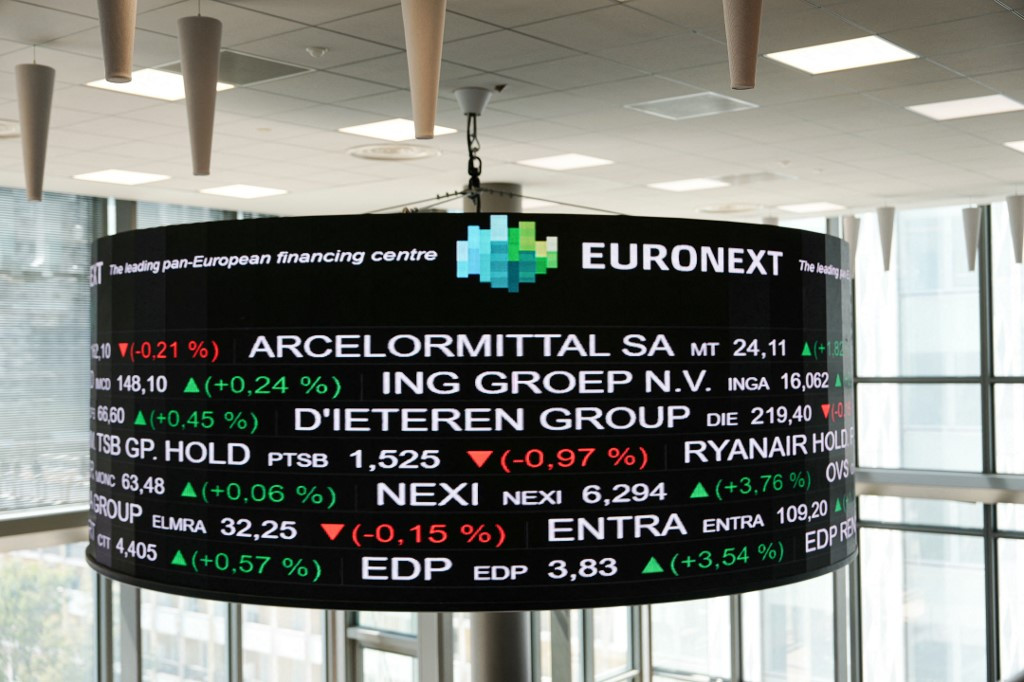Popular Reads
Top Results
Can't find what you're looking for?
View all search resultsPopular Reads
Top Results
Can't find what you're looking for?
View all search resultsEuropean stocks, euro drop as EU vote sparks uncertainty
Change text size
Gift Premium Articles
to Anyone
E
uropean markets sank with the euro on Monday after a win for far-right parties in EU elections and French President Emmanuel Macron's decision to call a snap parliamentary poll fueled uncertainty in the bloc.
The losses came after a mostly negative start to the week for Asian equities as a mixed jobs report eased worries about the United States economy but dampened hopes for interest rate cuts.
European traders sold up after a strong night for right-wing parties, which finished first in France, Italy and Austria and came second in Germany and the Netherlands, according to preliminary results.
Spanish Prime Minister Pedro Sanchez's Socialists were beaten by the right-wing Popular Party.
The Paris CAC 40 fell more than 2 percent at the open while the Frankfurt DAX and pan-European Stoxx 600 were also well down. London was also lower.
The euro weakened against the US dollar and British sterling.
Big losses for the liberal party of Macron, which lost out to the National Rally party led by Marine Le Pen, resulted in the president swiftly calling a snap parliamentary vote, fueling uncertainty in the key EU member.
France would vote for a new National Assembly on June 30 with a second round on July 7, Macron announced late on Sunday.
"I am confident in the capacity of the French people to make the right choice for themselves and for future generations," he said on X.
Swedish lender Skandinaviska Enskilda Banken AB said in a note to clients: "The EU is facing a historically challenging time with both internal and external 'cracking' in systemic issues that require increased, not decreased, cooperation.
"Difficult negotiations now await."
Meanwhile, with the Federal Reserve meeting this week, investors are keenly awaiting its updated "dot plot" outlook for borrowing costs, with commentators split on how many reductions are in the pipeline, if any.
All three indexes on Wall Street ended lower on Friday, but with the S&P 500 and Nasdaq still close to record highs after data showed that the world's biggest economy added far more jobs than estimated last month.
The reading, which came after earlier figures in the week had indicated the labor market was finally softening, suggested there was still some way to go before the Fed would be comfortable with cutting rates.
However, traders were comforted that the US was not heading for a recession as some had feared, in light of data showing factory activity contracted for a second straight month in May.
Fed officials are widely tipped to hold borrowing costs at their two-decade high, but traders are focusing on their forecast for rates this year.
The last guidance indicated three cuts, but several decision-makers have said they want to see more evidence inflation was under control and the jobs market was weakening before moving.
Commentators are split on how many reductions there will be, with predictions ranging from zero to three.
The Fed decision comes the day the closely watched consumer price index is released, which will provide the latest snapshot of the inflation situation.
Asian equities struggled on Monday, with Tokyo and Jakarta rising but losses in Seoul, Singapore, Manila, Bangkok and Wellington.
Hong Kong, Shanghai, Sydney and Taipei were closed for holidays.
Still, Lorraine Tan at Morningstar was optimistic about the outlook for Asian equities, telling Bloomberg Television: "We’re still expecting a soft landing in the States. As long as that's a scenario, I think Asian markets have upside potential."











